MangoReader is an award winning reading library and creative play lab that makes beautiful stories to delight and inspire kids. Our stories encourage creativity, improve language learning, build multiple intelligence and foster a love for reading for writers, readers, and artists of all ages. Name Email Subscribe
Don't wanna be here? Send us removal request.
Text
Get Ready for a New Collection of Reading Planet Stories
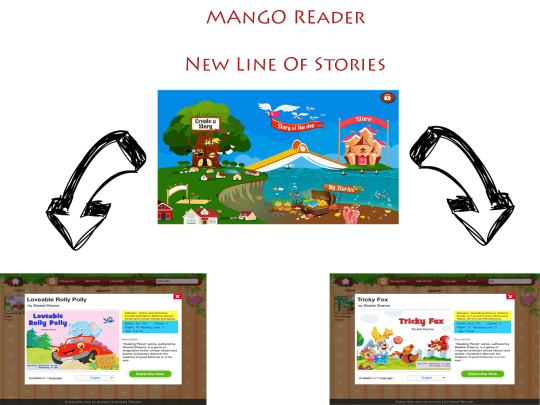
The Mango reader app is all out with a new line of entertaining story books. These books are catered to all ages. The author of these stories is the very creative and renowned Sheetal Sharma who has worked in collaboration with Tushar publications. It offers a fully interactive reading experience packed with Games, activities, learning puzzles and pictures, it is sure to bring a smile on your child’s face. The new line consists of eight interactive story books such as the ‘Lovable Rolly Polly’, ‘Tricky Fox’, ‘Basket full of toys’, ‘Share and be a Dear’ and many more.
Mango Reader encourages reading and literacy, we request you all to be part of our ‘Start Reading’ campaign which
- ENCOURAGES literacy skills with highlighted narration
- LEARN new vocabulary with tappable words and pictures
- RECORD your own narration & share it with others
- SHARE a story with your own voice and artwork
- TRACK reading progress and learning data.
For more information log onto-
http://mangoreader.com/read
Download our app on the App Store-
https://itunes.apple.com/us/app/mangoreader-storybooks-library/id568003822?ls=1&mt=8
And do make sure to review this app ;-)
0 notes
Text
A Mango-log of an intern

It was a fine Monday morning, sounds like an oxymoron doesn’t it? Interestingly it truly was a “ Fine Monday Morning.”
All excited to intern for a flourishing startup I walked in to the seemingly intense office. Although I was cleared of this misconception as it was a host of the friendliest people ever.
I was introduced to the team as soon as I walked in and given a brief of the rich history the startup possessed.
Mango Sense particularly interested me as it was something different from blazing high tech which had engulfed the startup market. It also provided a fusion of mainstream ebooks and standard animation clips. To me it proved to be the epitome of technological education for children.
So my first day at the office was pretty eventful, I met a lot of people and got an opportunity to learn about the company it its functioning. Most importantly I was enlightened by the true vision or mantra of this organization. Picasso once said that “Every child is an artist. The problem is how to remain an artist once he grows up.” Mango Sense as a whole preserves that thought an incorporates it in its products and motivations.
Working in a startup requires the ultimate form of passion and dedication. Tech Crunch and Wired articles are unable to portray the true emotions that go into startups.
While in school watching shows like Silicon Valley, movies like Social Network and Jobs and following startups from dropbox to airbnb truly gave me the hype about working for such companies. Fortunately today that urge is fulfilled, I can proudly say that I am part of the culture; with messy whiteboards,scattered tables, wires floating around the place, empty cartons, makeshift offices and most importantly high spirited and dynamic employees.
It has only been a few days since I have started my internship and to be honest the experience has been overwhelming and nothing like ever before.
The passion that mango sense incorporates in it’s workplace and products is different and truly what I would like to imagine my life to be many years down the line.
1 note
·
View note
Text
My Experience of the Pratham Pilot
A special post by an intern-Renuka Sagar on her experience with the Pratham pilot.
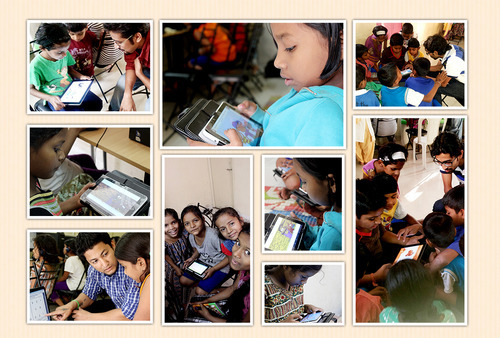
It was the month of November. I had just completed a month of my internship with MangoReader when I was mapped to Pratham NGO for its Pilot at Nagpur Chawl, Pune. I had no idea about the work I was appointed for. But still I was thrilled, for the Pilot was going to be a entirely new experience. And I was getting to explore new avenues, hitherto unexplored.
As I began with the Pratham Pilot, I realized that envisioning the role of education in one’s life was something in common with the organization and me. Being part of MangoReader and its ongoing reading program gave my colleagues and me an amazing opportunity to teach the young kids English through our digital story platform. Almost a month into the program, I have started considering the process of education more earnestly. I have developed more patience and sensitivity towards the needs of under-privileged children and have begun to see the bigger picture in revolutionizing primary education through technology.
On the first day when I entered the center; kids giggled and smiled as if they already knew what I was there for. I could see the excitement in their eyes at the prospect of learning English. They wished me genuinely and were waiting to get started with the class but before I could take the basic assessments they all started screaming as if something had happened but that’s the way they usually do in any of the classes. It was a bit irritating for me but I somehow tried to manage the rumpus into a pacific session and then my colleague Kritika and I started our Storytelling sessions. The objective was to get children interested in stories before exposing them to digital stories, something they’ve never seen. I noticed the watchful faces and the glean in the eyes of kids as we narrated our story of how Sringeri Srinivas got his haircut on his Annual Haircut Day.
I planned to spend most of my three-hour session talking about how the children could learn better with a greater focus on retention, comprehension and creativity.But I was confounded to learn that some of the kids had no clue even about the basics of the English alphabet-the ABCDs. We really had to begin at the beginning. I ditched my plans and focus on what would help these kids right then and there. I'd have been in a better position if I had known this during the planning stages. The lesson is to ask lots and lots of questions as you are planning what to teach – especially when you only have a limited time with your students.
During one of the earliest assessment days I asked a student his reasons to learn English? He answered with a straight face, “Di I want to learn English because I want to teach kids like u do”, and smiled. It was then I realized that the best teaching that you can do, starts with learners who actually want to learn. A good way of weeding out those who don't want to learn is by getting people to come to you (rather than the other way round). Now each and every student of our 5 centers is learning and growing daily with a smile that would lead them to a brightest future ever. The students who were already at the basic level of English are now becoming experts in reading stories of higher Level. What more could we ask them, they are still learning and would come to be the best. Kids who didn’t know the basic ABCD, now understands the meaning of a Word and it’s an achievement for all of us.
If I knew everything I know now about my students, I think I would have done things a lot differently in those three hours that I had with them. I also realize that a lot of the session was out of my control. But the good thing is that it made me think very deeply about how we teach. Do you know the funniest thing about teaching- you end up learning a whole lot more than you probably teach.
Pratham Infotech is one of the leading Non-Profits in the country in the field of primary education. Many of Pratham's books are on Mangoreader's interactive digital storytelling platform.
1 note
·
View note
Text
How Reading Aloud help kids learn fast

Most of us, as kids, defined chlorophyll and recited poems out loud to the walls, and most probably didn’t like doing it. Was it just a way for the teacher or the mother to make sure your mind was on your task and not wandering? It seems that was not all.
A child picks up language primarily by listening to it being used by its elders. Therefore the primary source of learning for a child has been the sound of the words, and when he learns writing he associates words with the sounds he is used to. Reading aloud reinforces this association to sound, and is easier for the child to relate to. It helps children grasp the connection of speech and print.
Reading aloud improves the ability to see images in your mind.Visualising things is an important aspect of memory. A word gains shape when read aloud, therefore remembering it will be easier the next time. This also is important for imagination. When trained to connect words and images made in the mind, making images and then putting them out as words becomes easier.
When articulated, the words become an experience. Memories are made by experience. One identifies cotton and silk by their feel. One remembers honey by its taste. The same goes with the written word and the ideas they form. ‘Experiencing’ words helps a child learn language perhaps more than anything else. If you are worried about your child’s skills in English or the mother tongue, you will help the child by reading out to him at an early age.
If you remember a word, you can use it in your speech. This means better vocabulary. The more a child reads aloud, the more familiarity he gains with the words, and this makes it easier for him to use it in speech. Reading aloud also does much for shaping interpretation of what is being said.
More sophisticated a child’s language is, more developed his cognitive thinking seems to become. Using increasing levels of sophistication in the language helps to develop the abilities to think critically and reason things out; and this increase in the level of language may be more fluid if it is read out aloud a lot.
Reading aloud helps increase the attention span. It has been said for long that the average attention span is somewhere between 45 to 60 minutes, which is why the school periods are broken up in those time spans. Recent studies have shown that the attention span in the younger generations are dwindling to 15-25 minutes, to match the 15-25 minutes span on almost all the TV programmes, after which there are commercial breaks. Children who watch regular programmes tend to adjust attention the TV time span, and there are not much kids who don’t watch TV. While it is impractical to advise that kids be kept away from TV, it may be wise to reinforce some reading, just to help them develop concentration, for their own good. While at it, let us make them read aloud, so as to keep the concentration at one place.
That’s another thing: reading aloud help sharpen focus. When reading aloud, one needs to keep the mind in the task at hand. Multitasking is something everybody practise at some level. While this is good, multitasking sometimes affects ability to concentrate adversely. Children can watch TV and finish their homework, but somehow, having done that homework never really helps when it is time to study for a test. Once learnt with good concentration, the lesson will not need learning a second time, it will only need revision. Reading aloud could help here.
Reading aloud therefore helps a lot when it comes to academics: it helps form associations, gain vocabulary, increases memory and concentration, and develops cognitive abilities. On a basic level, this habit could be imbibed by the practice of parents reading out loud to children from an early age. By reading out loud, you help your child develop a positive association with books and reading. Reading becomes fun.
Through all the fun, you also help your child build a good foundation to performing well, academically. Also, reading out loud to children helps improve your own writing and speaking skills. Modulating tones in dialogs to amuse children will give you confidence in general conversations. Hey, it is an opportunity to begin performing, eh? And to be sure, one day you’ll have raised an amusing conversationalist who also scores well at school.
0 notes
Text
What some kids did on Children's Day
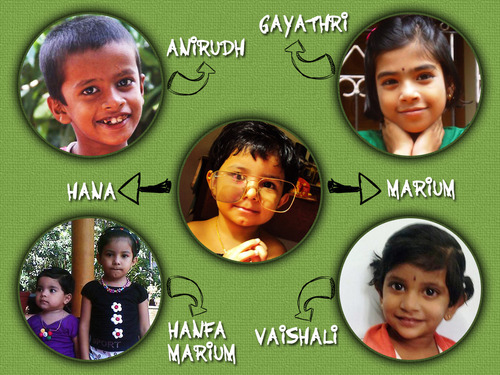
Little Hanfa, who had his first children’s day, didn’t know what ‘children's day’ was about, and was not too fussed for the want of that knowledge. But yes, there were sweets, and he got to go home early! Now wasn’t that something to be excited about?
Sai Vaishali, another first timer, didn’t know what children’s day was either, but it disturbed her that she was not able to enlighten us. So she figured a guess that was as good as anything else, and ventured that it was, perhaps the day when you do not wear normal clothes to school, but go to school dressed up as a rainbow. Incidentally, she had gone to school dressed as rainbow, for the fancy dress competition they had as part of the day’s celebrations.
Hana Marium knew teachers were going to sing for them and play skits for them because children’s day was the day to make children happy. There were sweets, and there wasn’t any classes. Everybody in class was dressed in ‘colour-dress’. Then there was Saturday and Sunday, so what was important was that you didn’t have to study for three days in a row.
Anirudh A. P. knows children’s day was Jawaharlal Nehru’s birthday, and that it was celebrated on that day because he loved children. Jawarharlal Nehru was an Indian Prime minister. In case you are wondering, he is in first standard.
The first thing Gayathri remembers about children’s day is a student from high school dressed up as Chacha Nehru handing roses to her class in kindergarten. She remembers the competitions they had every year – gather-sweets, lemon and spoon, and the skits, dances and songs the teachers and high school students did. She’s now in 7th standard and will most probably be helping out with programs from next year, when she will be in high school.
0 notes
Text
Future of Education in India
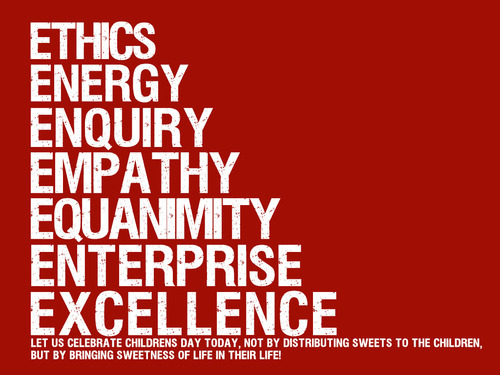
The purpose of education is twofold – one is the scholastic development of the child, which is the academic performance, grades, marks, subject knowledge and expertise etc. and the other is the co-scholastic development of the child, which is the development of life skills, social skills, emotional intelligence, creativity, communication skills and most importantly, character. The education system in any country should be able to achieve these twin objectives, for the child to develop and grow in to a healthy, happy and complete human being. And, the bigger plan is, if all individuals are brought up this way, the community becomes vibrant, harmonious and enterprising.
Unfortunately, all the stakeholders in the education system have taken short term view of it all. The parents feel the piece of paper at the end of the education is the key to a good job, entitlement to a place in society and so on. So, there is a mad rush to get hold of the best piece of paper in town, unmindful of the fact if their ward is deserving of it or even interested in that line of work. The whole ecosystem of schools and coaching classes has seen this as a business opportunity and is catering to the frenzy, forgetting their broader role in the society. As Gandhiji had said, education is what remains after you forget all you have learnt at school. So, people of character, academic ability and sporting or artistic prowess are mostly produced despite of the system, not because of it.
Youngsters nowadays are unable to bear the stress of societal pressures or the unhealthy competition at educational institutes and are committing suicide at an alarming rate. The lack of leadership at various levels of the society becomes evident when you see supposedly educated and professionally mobile people not thinking twice before tossing a banana peel out of their car window; crowds gathering in streets and loosening their arms in a brawl at the slightest instigation; people going on nonchalantly with their life unmindful of a person in a road accident who needs help; when you need to pay bribes even when you are grappling with the pain of the loss of your loved one just to get the death certificate from the authorities; the insecurities felt by girls and women going around alone today or top brains out of the top universities using their intellectual prowess in anti-social activities and not for the benefit of the society. If one analyses the root cause of it all and look at ways of fixing it, it boils down to how we bring up our children at school and what role models they see growing up. I suppose we need to realize that education system should strike a balance between scholastic and co-scholastic development of the child. Both are important and essential.
The purpose of education should be to:
Impart knowledge to know and knowledge to do
Create human beings, not machines
Create leaders who can follow, not leaders who are shallow
To practice tolerance and acceptance
To enquire, not just acquire
Above all, to develop 7Es – Ethics, Energy, Enquiry, Empathy, Enterprise, Excellence and Equanimity
As we live our life, not academics!
Let us celebrate the children’s day today, not by distributing sweets to the children, but by bringing sweetness of life in their life!
- Vaishali Nitturkar
About Vaishali
Vaishali Nitturkar is a kidologist, author and a passionate educationist. Drawing from her experiences of working with children in India, Kenya and Australia over the last ten years she has conceptualized and founded Gyan Tree.
#education#vaishali nitturkar#Gyan Tree#children's day#school#parenting#future of education#kidologist
0 notes
Text
A Tale of Tales

India is the land of stories. Myths, legends, fables, and folk tales - our heritage offers a virtual treasure trove of stories which educate, enthrall, enchant and entertain. India is probably the first country where story telling was used as a medium to convey values and wisdom. Vishnu Sharma’s Panchantra tales have travelled all over influencing and inspiring the literature of countries across the world.
With a legacy as rich as this it is sometimes worrying when I am asked the importance of reading and sharing stories.
I have conducted story telling sessions in schools in the continents of Europe and Africa as well as in the cities, towns and slums of India. I have reached out to Gen Y & Z through tales in print, on audio, in virtual and now in the digital media. Irrespective of time, space, language and medium I have been lucky to establish a connect with the kids which has been nothing short of sublime.
Why do I spend so much of my time and energy in spinning and sharing yarns? For money – hardly. I wouldn’t be able to maintain my pet Labrador for a week on the money I get. In fact, more often than not the balance sheet of storytelling is titled heavily on the debit rather than the credit side. Do I do it for fame? Far more people would be aware of a two bit star on a weekly comedy show who shakes his behind than they would be of me and tale telling abilities.
I do it because it makes me feel fulfilled. It makes feel self-actualized. It makes me feel alive��.
Why should you as a parent share stories with his or her kids?
When you tell a child a story, you create a bond with him. You give him your undivided attention and also get his. You share something which is very valuable to you - your time - with him. Through your stories you can help your son enhance his imagination and creativity. And most important, you can teach him the value of values.
Of all the things my father taught me, possibly the one that I cherish the most is the value of reading. From a very young age read to your child as much as possible. Get her to fall in love with your words and the pictures in the book. As she grows buy her attractive books with pictures and help her read on her own. Encourage her to ask questions and answer them patiently. As she adds years, add books to her life. Let reading become a regular part of her routine. Discuss her favorite author and characters with her. If you haven’t heard of them read up a bit yourself. This will make your ties stronger. Moreover, if she catches you reading she is sure to imitate you.
Build your own little library and keep it well stocked with books of different genres – so that anytime she wants to reach out for something interesting it is always there for her. On her birthday encourage your friends/relatives to give her books. You too make it a habit of giving books as gifts. This way, not only will you be setting an example – you will also be promoting the reading habit.
If your child is comfortable with her Cell Phone or Tab you can introduce her to new apps which make stories digitally interactive and are increasingly becoming popular.
It really doesn’t matter whether you read out stories from a book, or a digital app. It is of no consequence whether you are hearing the story together or you are spinning your own yarn. What is most important is to share the magical, funny, mythical, crazy universe of tales with her.
RAMENDRA KUMAR
About Ramendra Kumar
An award winning author, Ramendra Kumar (Ramen) loves to dabble in fiction, poetry, satire and travelogues. 25 books written by him have been published by well known names and translated into several Indian and foreign languages. His writings have found a place in textbooks and anthologies, both in India and abroad. The first edition of his latest book Mohini was sold out in the very first week of its release. His first book of non-fiction Effective Parenting : A New Paradigm, published on Amazon Kindle, too has been very well received.
Ramen is an inspirational speaker and storyteller for children and has also been conducting creative writing workshops across the country. He has his own website www.ramendra.in and a page devoted to him on Wikipedia.
About Kirtana : Voice-over artist for ‘Happy Friendship Day’ by Ramendra Kumar
Hello, I am Kirtana Prakash, an 8-year old girl studying in grade 3 at Vidhya Niketan Public School, Coimbatore. I am a voracious reader and a keen Carnatic student. I love star-gazing in the night sky with my father. I also like to write in my spare time. I dream of becoming a Space scientist in future and an accomplished Carnatic singer too. Recording ‘Ramen’ uncle’s stories have been a pleasure for me since his stories are interesting, educational as well as fun to read. Thank you for this wonderful opportunity, Ramen uncle.
About Swadha : Illustrator for ‘Toto and Hari’ and ‘Happy Friendship Day’ by Ramendra Kumar
"I am Swadha Mohanty, a student of class 12.From the very childhood, my ambition is to become an artist who can do the nation proud in the field of art and painting. I want to study in National Institute of Design, Ahmadabad and hone my skills.My hobby is reading short stories (English), making crafts with any unused item, watching TV mainly 'Satyamev Jayate' etc. in addition to of course doing art.I was really thrilled when I saw the story ‘Toto And Hari’ on my computer. It felt great to reach out to my audience through a new medium.
0 notes
Text
Mind Games

When I go to drop my daughter to the bus stop every morning, I observe other kids and try to follow their conversation without been obvious. Mostly, the conversation is about movies, TV serials, smart phones and latest electronic gadgets.
Kids today are smart and technology savvy. They are aware, observant and sharp. However, I find these kids extremely restless. It’s not an attention deficit disorder but an urge to do something new all the time. Minds have no patience, and perseverance has vanished.
Man and Machine
We have become a race that needs a machine to sit still. While watching TV, we have the constant urge to flip channels. Our children follow our foot-steps. They yearn for new gadgets and toys. On a holiday most kids spent time watching the TV or on the computer accessing the social networking sites.
Where are we going? Gone are the days when children ran and played outside. Read books played indoors with simple toys. At times, they played creative games constructed by them. Pebbles, stones, seeds threads, colours anything could fire the imagination.
Childhood is about dreams and fantasy. It comes from active participation and not from passive entertainment with eyes glued to a shining screen. Technology is beneficial if used judiciously.
An ideal childhood should be like described by Luther Burbank-
“Every child should have mud pies, grasshoppers, water-bugs, tadpoles, frogs, mud-turtles, elderberries, wild strawberries, acorns, chestnuts, trees to climb, brooks to wade in, water-lilies, woodchucks, bats, bees, butterflies, various animals to pet, hay fields, pine cones, rocks to roll, sand, snakes, huckleberries and hornets: and any child who has been deprived of these has been deprived of the best of his education.”
We monitor our kids by providing ready- made solutions. Kids are spoiled for choices today. They don’t have a moment to get bored. Getting bored is really helpful ironical it may sound. When a child gets bored, he will devise something creative from what is available. This enhances imagination, creative and independent thinking.
If we decide to come out of the passive entertainment trap, we as parents have to set an example. Going for nature walks, creating a balcony garden or enjoying adventure outdoor activities will be great for everyone.
Let’s decide to have a cosy nook for the family. Have colourful books for young kids and others according to their age. This nook could be a creative space where kids can do anything.
Reading on iPhones and iPads is fine as it provides visual element to books. Today, you can download story books, activity books even hobby courses from the net. Decide to pursue a new hobby with your kids.
I am sure it will help bond closer, become peaceful and increase focus. And the best outcome would be fostering creativity.
- By Nupur Roopa
About Nupur Roopa
Nupur Roopa is an Indian writer and blogger. Her stories take the reader to a parallel yet beautiful world. Her fondness for children makes her write the magical word for kids. Nupur Roopa’s recent writings have also been featured in the flight magazine of Paramount Airways, New Woman, Ripples, Toot and Child among others.
0 notes
Text
Importance of Reading

Everybody agrees that reading is a good habit: but only an avid reader could tell you how good it is to have it as a hobby. Reading becomes a hobby that could be practiced easily and amuses endlessly because what is most needed is an imagination that is willing to be exercised. A bookworm who’s given a good book is like a dog taken out for a walk: what new smells, what fresh world! But before qualifying anyone to be a good bibliophile, ask how widely read they are: because if there is any scale to judge the quality of anybody’s reading, it is the versatility in the choice of their books.
For one thing, reading exercises our minds. Now if you ask a good fitness expert, they would say how important it is to have diversity in the exercises in a good fitness regime. The same applies for reading too. The same pattern or style of writing for a long time ceases to invigorate the mind. So if you are reading to keep your mind sharp and active, give it a variety of things to think about.
A person who reads widely will be a good conversationalist. Reading widely gives a wide array of information and anecdotes. Such a person will not be obliged to stick to one or two topics, but will intelligently discuss anything that comes up. Such people are the salt of conversations, and people to whom everybody turns to when needing information or opinion.
It is wise to read widely because no one viewpoint is going to be the absolute truth, and no one writer is going to be the ultimate authority in any matter. Every writer however insightful, put their own opinion into any work. It is said the history is written by the winners. If Hitler had won, literature will surely sound rightfully anti-Semitic. And by that example, it has been implied here that Hitler’s ideology is not the best, which is the writer’s view. It is important to read all sides of a topic to have a complete understanding. To claim to have a good understanding of any topic, one must have read different viewpoints about the particular topic.
Reading widely helps us develop connections and helps us achieve new levels of cognition. Wider platter of knowledge would give wider possibilities of supportive interpretations and a more holistic analysis of any concept.
Reading widely helps one form informed opinions. If you have read up on a lot of aspects of a particular subject, nobody needs to tell you what your opinion need be: you could analyse what you have read and form a sound one yourself. The ability to make sound opinions develops self-assurance that helps to make decisions, which is a mark of a sound character.
It also develops one’s vocabulary and language sophistication. Reading widely exposes a person to new and varied styles of writing and will help pick up useful jargon and phrases. This will help develop one’s comprehension powers and will also reflect in one’s writing and speaking skills.
Those who read widely will gain the ability to process a variety of kind of information, and will therefore be able to adapt easily to different things. Practically nothing becomes too much to handle. Reading widely develops an attitude that there have to be a solution to everything: mostly, that attitude in itself is a good solution.
Reading widely helps develop tolerance, which is one thing that will make this world a better place to live in. reading widely means understanding a lot of ways of life and comprehending a lot of different opinions. This will develop into an understanding that not everybody carry the same opinions; not everybody live the same life. Differences in opinion and choices of other people suddenly are fine: after all, variety is the spice of life.
And if variety is indeed the spice of life, it surely would do to have some in your reading list, wont it?
0 notes
Text
When to call your child's Teacher
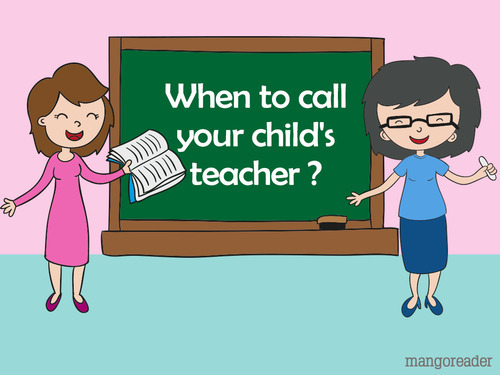
In our previous post, we dwelt extensively on deciding if your child is ready for school. Considered, the mother of all questions, the problem doesn't end there. Unfamiliar faces, alien motifs and queer bespectacled women barking orders at you, could all seem overbearing on the child.
What with 24 hours not being enough for a days work, it seldom occurs to anybody to call the child’s teacher unless the moppet is in trouble. In fact, in that case she might be the one who asks for the call. It is not that you have anything against chatting with your child’s teacher; it is just that there never is the time for it. The teacher is usually surrounded by a bunch of boisterous kids, and knowing by experience how hard it is to keep up with just one of them, you really don’t have the heart to take up more of her time than strictly needed.
But talking to your child’s teacher often pays off. Parental involvement helps the teacher identify with the child as more than just another child sitting in her class, and this works wonders for your child. Suddenly the teacher is not an imposing adult, she is mama’s friend, she is approachable. Children who grows up amongst adults who identify with them on a personal level grows up to be self-assured people who can socialize well. People who have grown up in a village or a similarly close-knit society will know. This holds true for every adult in your child’s life, and the teacher is the most important adult outside family with whom the child interacts.
If you child find the curriculum followed too hard, call the teacher. The same applies if the curriculum is too easy also. Children tire easily of goals that are too high and bore easily of the ones that are too easily achieved. Talk to your teacher to find out how the curriculum can be made easier for the child, or how an easy curriculum maybe supplemented with other material that may utilize the child’s imagination more.
If there is a note in the diary that is unclear, call the teacher, no matter how trivial it may be. The teacher would prefer the inconvenience of a minute’s call to a bigger one that may be caused if you try to guess and get it wrong.
If your child is going through emotional difficulties, call the teacher, and tell her why, if the reason is known. The child spends a majority of his waking hours with the teacher and the teacher would like to know that the moody spells are not just for the school. She might even be able to engage him better and help him out of it.
If the child shows a change of attitude towards school, call the teacher. The usually enthusiastic child might sometimes develop anxieties about going to school for no apparent reason and even if doesn’t amount to actual tantrums, the teacher would like to know. It will help her look for the cause of the discomfort, like bullying.
If there have been obvious signs of bullying, inform the teacher. The child may not be able to tell her out of fear of being picked on even more, and most probably the child is dead against you telling her either. But bullying is not something that is left for the child to handle himself, and parental intervention might be over the board sometimes. The teacher is the best person to intervene. Also, she will be able to help the aggressor, who also is just another kid.
If there have been complaints about the behavior of the child from people outside the school, call the teacher. Children can be complete angels at home and mutate into the bully or the bore outside parental purview. Therefore, if the neighbour complains about bad behaviour, call the teacher and check up before deciding it is the other child’s problem.
More than all, the interest taken in calling his teacher will not go unnoticed by the child. It implants somewhere in his mind that you care. Your interacting with the teacher induces a level of personalization into the process of education. The more warmth this could bring to your child’s early years, the merrier. The teacher would also appreciate knowing the interest taken in your child does not go unnoticed.
0 notes
Text
Is your child ready for school?

Is your child ready for school?
Mostly, this question is answered with a shrug and the remark, ‘well, she’s 5, and she knows her numbers and letters…”
A child’s age is the only parameter used by most kindergartens in india. Though a child’s mental capability can be generalised by age, it cannot be considered to be the only deciding factor. In fact, there is no one factor that can determine the readiness of a child’s readiness. And even though it is only KG, and we needn’t react to it as if it were aerospace engineering, it is important. The KG is the first time your child comes in formal contact with the educational system, and if the experience is traumatic, it will reflect in his performance in education in total.
The screening tests at the KGs make sure that your child already knows at least half the syllabus of the first year before they take the child in. therefore, you would already have taken care of that necessity. There is also an age limit that requires the child to be at least 5 before joining the KG.
More than the ‘academic excellence’ in being able to parrot-state letters, numbers , fruits and part of the body, try and instil real curiosity to learning in your child. Tell your child anecdotes about school in a way he looks forward to it. Help him understand that he is going to learn a lot more in the KG and get him to look forward to it. No matter how much your child enjoyed his day care, a KG is a real school and will be different. He will be able to cope with the rules and intimidation of the new environment if he has actual curiosity towards what is taught.
Your child has to have a good level of self-sufficiency before entering a KG, where there will be more kids than the aayas there can handle. Being able to use the bathroom and being able to claim his own belongings are the minimum, as are very important. The child should also be able to perform small tasks on instruction, so as to not have to depend on the elders for everything.
Your child should have a good level of motor skills so as to not fall behind. Writing begins fast in the KG and a child who cannot hold the pencil properly will lag behind. Being able to cut with a pair of scissors, opening and closing containers etc. are other instances. Your child should also be able to run, jump, hop etc. as individual activities, as opposed to doing all that as part of play.
It will probably be the first time your child is with a good number of other children for a good number of hours. Make sure he is capable of good interaction, and is willing to make friends. This is where 80% of the beginners have issues. Does he understand things like cooperation and sharing? Does he tend to handle fights rashly or does he tend to break into tears too easily? A child who is not emotionally ready to socialise will find it harrowing to interact with so many suddenly, and it is needless to put the child through that unsure situation too early.
Being able to interacting with elders also is important. The child should be able to obey, to take instructions (there was this series which talked about another planet and a clock tower which looked after kids. There were stories in that series that we could use here) from the teachers and able to interact without reserves.
He should be able to mark the KG staff and be able to communicate with them for his needs, without reserves. KG is the first time your child is exposed for long hours, and no matter how secure the KG, re-emphasise the lessons on talking to strangers, this time introducing the teachers and perhaps other KG staff into the list of adults they should ask help from.
0 notes
Text
Riddle me this and Riddle me that

Riddle me this!
How many times would you have heard this phrase, always preceding a witty question that made you think?
Countless times, to be sure. Though its nature differs, riddles seem to have been a fairly universal means of infotainment. They are amusing, and thought provoking too, at the same time. Curiosity is inherent in human nature and it is to this trait that riddles appeal. We being a race that survives through learning and mimicking, Educating the next generation has been given premium thought since the first civilisations. Proverbs, puzzles and riddles has to be among the first tools of education, simply because they capture the young imagination and imbibes in them healthy intellectual humour.
Riddles have long since been recognised as effective learning material not only in the social and moral levels of educations, but also in academic teaching. Riddles make students think, and sometimes think as a group. Riddles, for one, enables bonding because when one hears a riddle that is difficult, one cannot help but muse aloud, beginning discussions on what the answer might be. It is one of the most commonly used teaching aid in ESL classes. Nobody is too old to wrack their brains to crack a good riddle.
Riddles and puzzles are a great way to instil curiosity and creativity in children. It develops logical thinking, reasoning, ability to connect things and a discerning sense of humour in children. Once they get the hang of it, children learn to figure allusions and reason out the problems posed in a riddle. Children learn to think deeply, to muse over the tiniest details of the question posed to them and to express the answer that they think up in a cognitive manner.
With riddles, wordplay is a big thing, and through these children tend to learn the intricacies and subtle allusions used in the language in which the riddle is posed. Vocabulary and skill in languages grow through engaging activities, and what can be a stronger memory hook than a well phrased riddle?
It has been found that children who are regularly exposed to tricky questions that demand witty answers develop an ability to think on their feet, use logic and reasoning in everyday situations and more importantly develop a sense of right and wrong. If you are still podering what can stay in a corner and go around the world, well, you’ve come this far, the answers a stamp.
There are various types of riddles, and all of them are found to be equally effective. Riddles can be oral or visual; riddles can be situations based or may be allusions to seemingly unconnected things. The answers can vary from simple math to animals or generic like the wind, sun or moon. Posing a trick question in the middle of a tale is one of the easiest ways to catch a kid short, and asking a question in between is almost a rule in storytelling. Even without a story ask your child, ‘what goes up when the rain comes down?’ Let him ponder this for some time, then blurt out, “an umbrella!” and giggle with the child. That bit of bonding didn’t require a lot of effort, did it?
0 notes
Text
8 Reasons to Read to Your Child Early On
As Mayor De Blasio’s Pre-k initiative gets off the ground in New York City, the impact of early learning is becoming increasingly apparent. According to reading specialist Maryanne Wolf, “Learning to read begins the first time an infant is held and read a story.” She also adds that the more talking children hear and the more they are read to, the more words they experience and the more prepared they are for school learning. While many parents know that reading to their kids is important, they aren’t clued into its specific benefits. Here are eight important reasons to read to your child early on:
Expansion of world view. In books (and in conversations) children are exposed to new ideas—they visit far away places, see new things, feel new feelings, and go on cognitive and emotional adventures.
Object identification. Vision, perception, and language work together to connect an object with a word, and then children develop memories of what they’ve seen. Books increase their scopes of reference.
Everything has a name. It is easy for adults to forget that infants and toddlers don’t know a fork is called a fork, a tree is called a tree, and so on. When we talk to children we name their world and expand their universe of concepts. Books do an even better job of catapulting this process through image and story.
Connection between text and image. Beautiful images encourage focus, questioning, and the drive to know more; children begin to use pictures to prompt letter and word recognition, connections with characters, and sequencing skills.
The delight of literary language. The pairing of powerful images with evocative literary language helps to develop children’s minds. Growing up hearing older and/or more complex language allows children to develop an ever-expanding universe of words.
Phonological development. As children hear language they begin to identify different sounds, and learn to connect starting and ending sounds and make rhymes.
Book sense. Experience handling books teaches children the logic of how texts work physically, the direction in which the home language is read, and the rhythm of turning pages.
Letters make words and words make sentences. Children who are read to begin to understand the building blocks of the reading process. They recognize each letter as an object with a sound, each word as a small picture, and multiple words coming together as a sentence with meaning.
Beyond these eight important reasons, reading is just another way to bond with your child. So encourage more talk at home, in your kids’ classes, and in infant and toddler learning centers, so we can expand the minds of these early learners.
AUTHOR: RENEE BOCK
Renee Bock is a dedicated early childhood educator, who is currently the educational director at Explore+Discover, a social learning center in Manhattan. She has a master’s in early childhood education and more than a decade of experience in the field.
0 notes
Text
Too Much Noise - Too Good Collaboration
Today was another one of those special days.Got this email in the morning.
"Dear Jagdish,
Greetings for the day. It gives me great pleasure to share some good news with you. Pratham Books won two awards for 'digital book of the year' and 'publishing innovation of the year' at Publishing Next (Sept 19-20, 2014). This is an annual event at Goa that focuses on trends in the publishing industry and had instituted industry awards this year for categories such as Printed Book of the Year, Digital Book of the Year, Bookstore of the Year, Publishing innovation of the Year and Publisher of the Year. The digital book of the year was given to Pratham Books for 'Too Much Noise'.This award recognises the collaborative effort that brought together people from diverse organizations to work together to create good books for children.Thank you and your team for helping us create the app version of this book. Here's the blog post with more details about the award : http://blog.prathambooks.org/2014/09/pratham-books-wins-two-publishing-next.html Mango Reader's participation in this collaborative effort led to the creation of this book and this recognition is as much yours as it is ours. We are happy and proud to have you join us on our journey of getting 'a book in every child's hand'. "
We are proud to have worked with Pratham Books on the award winning digital title 'Too Much Noise' at the Publishing Next Conference.
English: http://mangoreader.com/live_stories/5305ec8369702d379d030000/Too-Much%20Noise
Marathi: http://mangoreader.com/live_stories/5305fb8a69702d4e17030000/Too%20Much%20Noise-%20Marathi/
Hindi: कितना शोर
Kudos to Pratham Books and their amazing mission and Team MangoReader's collaboration to win an award.
Really awesome.
0 notes
Text
Mangoreader’s iOS app gets a facelift in v2.0
Mangoreader released v2.0 of its iOS App today. With this version comes a host of new features for both free and paid users.
Story of the Day
Previously available only to web users, now iOS users can navigate to the story of the day right from the home screen of the app. These stories will be automatically updated. So keep coming back everyday for a new story of the day.

Free Users
Free users can enjoy one new story every day which is delivered right to their home screen on the click of a push notification. Enjoy upto 30 stories every month. And in case you missed the story of the day, worry not. You could always subscribe to get access to the complete collection of stories of the day.
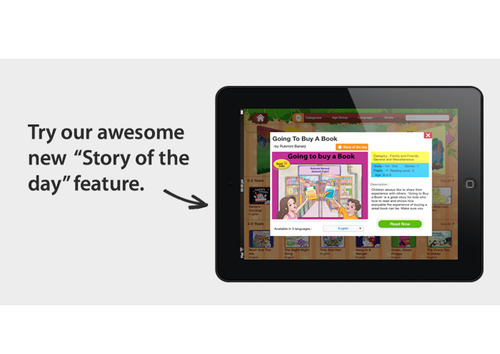
Languages added
We’ve also added a host of new languages like Punjabi, English (US) and fresh stories in Hindi, Tamil and Spanish. With basic to advanced stories, these seminal stories help you learn languages. With significant improvements to grade levels (discussed next), you’ll find yourself or your child making progress and analyzing it as well.
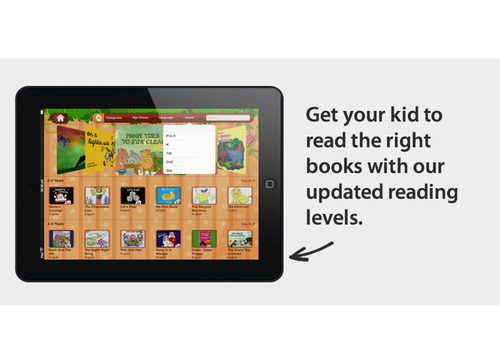
Grade Level
Our learning team has worked day in and day out to ensure that grade levels are aligned to Cambridge International Baccalaurreate standards. All 800+ books are now aligned to these standards with books categorized according to grade based on the number of pages, complexity of words and sentences.
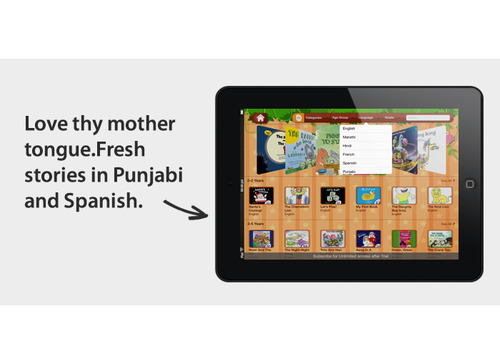
Other Bug Fixes
We did receive some complains of some bugs like some stories stopping after a certain number of pages and one off incidents of app crashes. These have been fixed. One problem that was consistently reported was that book downloading stopped when the iPad screen went into sleep mode or users moved into a different app.
With the v2.0 release, you should be able to download stories even while the iPad screen is on sleep mode.
That’s all for now folks! Do update the app and give us your feedback in the comments!
0 notes
Text
Remembering our National Language on hindi diwas
Language is an important aspect of culture. It is a dominant feature in determining nationality or ethnicity. It is a binding force that unites a people, and makes them distinct from others. Language represents a people’s heritage and identity. Language has played the significant role in the creation of identities among the major communities in India. Hindi – one of our oldest and most complex languages, and a language that is still vital and evolving.
Hindi belongs to the Indo-Aryan branch of the Indo-European language group. Later Hindi was influenced by Persian and the Mughals made their own modifications to the language along the way. Even though Hindi has evolved from Sanskrit, many of its words find their origin in Arabic or Persian. Hindi, as a language, has travelled across the globe and is spoken not only in India, but also in countries like Mauritius, Surinam, Trinidad and Tobago, South Africa and New Zealand. The national official language of the republic of India and the 3rd most widely spoken language in the world, Hindi is spoken by close to six hundred million people across the globe either as their first or second language.
Come September and we mark the 14th day of this month as the “Hindi Diwas” in India to pay tribute to this widely spoken language and to mark the anniversary of it being declared as India’s national official language, we celebrate the Hindi Diwas all across the country! On the occasion of Hindi Diwas, many schools and colleges organize different literary programs to pay respect to this language and inculcate in the students a sense of belonging towards this language. Students participate in various competitions/cultural activities like ‘Hindi Essay Writing’, ‘Hindi Plays’, ‘Hindi Poetry Writing’ and so on. Some schools/college observe the entire second week of September as the ‘Hindi Week’ and organize a lot of activities in this week. I distinctly remember having celebrated ‘Hindi Diwas’ while in school and how we vowed to give respect to this mother tongue throughout our lives.
Talking of its development and evolution, Hindi is a 300 year old language with a rich literary and grammar tradition. It is a descendant of Sanskrit and has evolved over a long period of time with its forms ranging from Classical Sanskrit to Pali Prakrit and so on. Right through its birth, the language has acquired many names ranging from ‘Hindustani’ to ‘Hinduva’ to ‘Khari Boli’ and many others! Finally the name ‘Hindi’ happened to be its permanent name. It’s a fact know to everyone probably that Hindi is written in Devanagri Script and is known as the modern Indo-Aryan language. It has been influences by a confluence of scripts and languages like Dravidian, Turkish, Farsi, Portuguese and English.
The modern day Hindi language evolution was seen somewhere around the 18th century when the Fort William College was established by the East India Company in Calcutta and the principal of this college, John Gilchrist wrote the grammar of and compiled a dictionary to teach Hindi to the students of the college, all by himself.
Although, modern day Indians are too much influenced by the western culture and owing to the presence of India in the global map, learning and making use of English cannot be avoided, still Hindi will always remain our rashtrbhasha. It will always be a unifying factor of the people of our nation and will always represent India across the globe. Let your kids learn Hindi with MangoReader
0 notes
Text
Celebrating World Literacy Day with Punjabi stories

“The man who does not read has no advantage over the man who cannot read.” - Mark Twain
The role of language of instruction in the educational process or in accounting for literacy has been long debated with no clear consensus. In the new sharpened focus on the reasons for educational failure, language has emerged as a significant variable in producing gains in educational efficiency. Literacy, a fundamental human right and a foundation for lifelong learning is also a catalyst for social and human development with its ability to transform lives and facilitate full participation in society.
Using the language the child understands – the child's first language, or mother tongue – for teaching lesson content, not only enables the child to immediately master the content, but in the process, affirms the value of the child of her/his cultural and linguistic heritage. The cultural embedding of local languages means that local- language literacy brings the use of written text into the everyday life of the learners. First language education teaches children how to learn by using a familiar medium, and in the process builds critical thinking skills – cognition – absolutely necessary in the learning process.
Low levels of literacy skills are associated with greater unemployment rates, lower income, increased health risks, and disengagement from the greater society. This situation of isolation is worsened by technologies, including mobile phones and the internet, which are becoming more and more common and bring information about unlimited topics to those who have access to them. Sadly, in many countries, students are able to complete primary school without the ability to read basic text. Without basic literacy skills, many are left out of modern economies and denied economic and social opportunities. Technological advances have led to a growing demand for skills beyond the traditional reading, writing, and mathematics. Employers are now looking for soft skills, especially the ability to comprehend, analyze, and communicate complex information and situations. In many ways, literacy is the first step on the path to opportunity. Recognizing this importance of literacy, UNESCO on November 17, 1965, declared September 8 as International Literacy Day. And, on this International Literacy Day
Mangoreader in its attempt to bring literacy to a larger section of the society has created stories in yet another Indian language-Punjabi.
1 note
·
View note